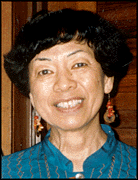

![]()
View Point


![]()
View Point
When I voted for Mililani Trask to become an Office of Hawaiian Affairs trustee, I was impressed by her dedication to Hawaiian issues and concern for the destitute. Trask is learned,
but lacks wisdomHer ability to articulate the social, educational, cultural and economic needs of Hawaiians within the political arena was apparent. I was also happy that she had befriended the Dalai Lama and Mother Teresa.
What I overlooked when I supported her, however, was the most important tool needed to become an effective leader. The early Hawaiians called a person with this quality "kanaka makua," an emotionally mature and wise individual.
This characteristic was the pinnacle of wisdom, and a goal for Hawaiians. The kanaka makua was modest, patient, compassionate, thoughtful, generous and caring. Above all, he or she felt responsible for other people's feelings and happiness, not just one's own.
Our beloved alii exemplified and practiced these values in many ways:
By their thoughts, deeds and actions, we can appreciate where the minds and hearts of the alii were. They were loved by their people because they behaved like kanaka makua.Princess Pauahi left her estate so that Hawaiian children could be educated.
Queen Liliuokalani wanted her estate to be used for indigent and orphaned children.
Queen Kapiolani, with her husband King Kalakaua, founded a hospital named after her.
Queen Emma and King Kamehameha IV established Queen's Medical Center.
King Lunalilo left his estate to care for the elderly.
Kalakaua's mission was to revive the Hawaiian language, chants, songs and dances.
In the ohana of ancient Hawaii, the extended family was all inclusive and not confined to blood members only. It was a family that was color blind and accepting of one another's differences.
The ohana had a sense of unity and harmony, cooperation, mutual understanding, responsibility and interdependence. These qualities personified the basic character of what it meant to be kanaka makua or someone who lived the spirit of aloha.
We would be wise to practice lokahi (oneness and harmony) them as we interact with others, day to day. The valuable gift of the aloha spirit is needed more than ever before.
Trask has learned to use the tools of the technological world. She knows how to gather information and data and has scholastic skills. We could say that she has gained worldly knowledge and is educated.
BUT the spiritual qualities of her heritage are missing, otherwise she would refrain from demeaning herself and those she represents.
Even if we are not aware of the full content of Trask's anger toward Sen. Daniel Inouye, her hateful name-calling is definitely a setback for the issues she pursues and wants to solve.
And for those who exposed her taped thoughts to the media, I can only say, "How long will it take for us to leave the infantile stage and grow up, to become kanaka makua? Auwe!"
Many Hawaiian proverbs express how detrimental the tongue and mind can be. The proverb "waha awa" is meant for anyone, including me, who has cantankerous thoughts and expresses such bitterness.
The speaker with a bitter mind and mouth does damage not only to others, but herself or himself as well. I can only imagine how Senator Inouye must feel. I would like to express my deepest aloha to him and his loved ones.
I encourage Hawaiian leaders to nana i ke kumu -- look to the spiritual source and Hawaiian values for guidance.
And, for the sake of all who live in Hawaii and the world, use these priceless traditions generously. It's the only way to peace, goodwill, happiness, good health and prosperity.
Cecilia Kapuaokaainaokuuipoleimanu Lee Lindo
is a retired teacher.